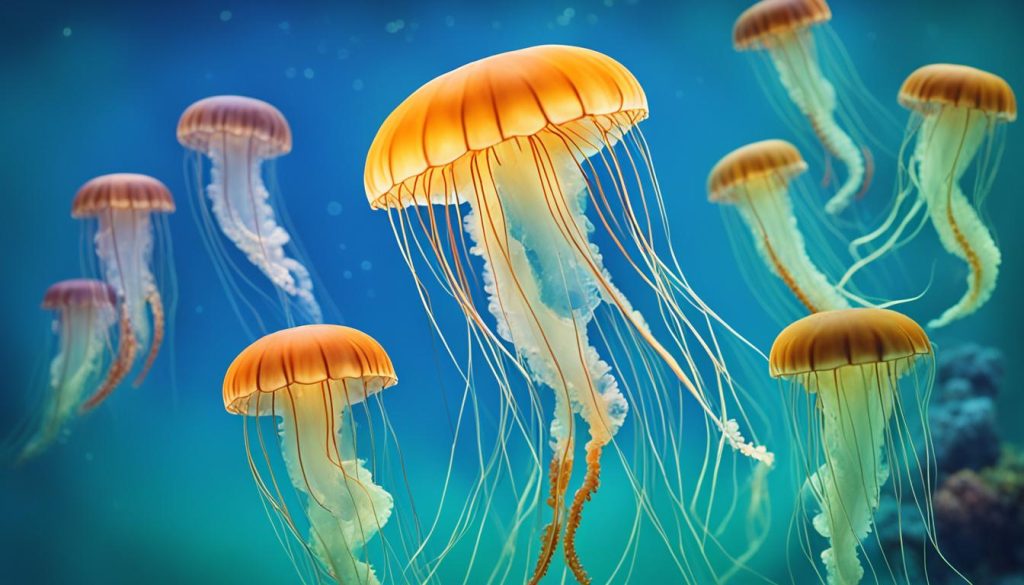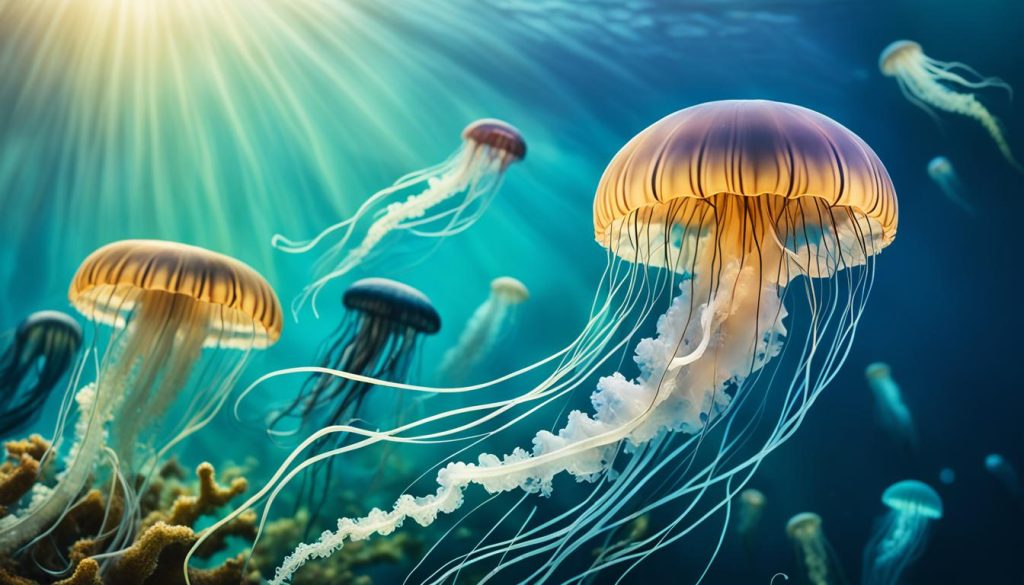Have you ever wondered how long jellyfish live? Are they simply transient creatures that drift aimlessly through the ocean, or do they possess a hidden secret to longevity? Prepare to dive into the fascinating world of jellyfish and uncover the truth about their lifespan and life expectancy.
Contrary to popular belief, jellyfish are not as short-lived as one might assume. While some species may have a brief existence, others have been known to defy expectations and survive for several years. So, what determines the duration of a jellyfish’s life?
In this article, we will explore the intricate factors that contribute to jellyfish lifespan. From the environment they inhabit to their unique adaptations, we will unravel the secrets behind the survival and longevity of these mesmerizing creatures.
Key Takeaways:
- Jellyfish lifespan varies, with some species living only a few months while others survive for several years.
- The environment and habitat of jellyfish play a significant role in determining their lifespan.
- Jellyfish possess remarkable adaptations and life cycle strategies to enhance their chances of survival.
- Understanding jellyfish lifespan offers insight into the delicate balance of marine ecosystems.
- Exploring jellyfish longevity challenges preconceived notions about these captivating creatures.
Factors Affecting Jellyfish Lifespan
Understanding the factors that influence jellyfish lifespan is crucial to comprehend their life expectancy. Several key factors play a role in determining how long jellyfish can survive, including species, environment, and reproduction.
Species: Different species of jellyfish have varying lifespans. Some species, like the Turritopsis dohrnii, popularly known as the immortal jellyfish, have the ability to revert back to their juvenile form, essentially achieving biological immortality. Others have a lifespan ranging from a few months to several years.
Environment: The environment in which jellyfish reside greatly impacts their longevity. Factors such as water temperature, salinity, and availability of food and oxygen can affect their survival. Some species thrive in colder waters, while others prefer warm, tropical environments.
Reproduction: The reproductive strategy of jellyfish plays a significant role in their lifespan. Certain species, like the moon jellyfish (Aurelia aurita), have a short life cycle with a focus on rapid reproduction. These jellyfish may live for only a few months but reproduce in vast numbers. On the other hand, some species invest more time in growing and maturing before reproducing, resulting in a longer lifespan.
“Jellyfish longevity is influenced by various factors, including species, environment, and reproduction.”
Understanding these factors not only helps us appreciate the complexity of jellyfish life but also offers insights into their survival strategies. By adapting to their surroundings and adopting various reproductive strategies, jellyfish have managed to thrive and survive through the ages.
The Remarkable Adaptations of Jellyfish
Discover the amazing adaptations that jellyfish have developed to ensure their survival and longevity. From their unique life cycles to their ability to regenerate, these adaptations contribute to the overall lifespan of jellyfish.
Life Cycles
Jellyfish undergo a complex life cycle that consists of various stages. They start as tiny larvae, known as polyps, which attach themselves to underwater surfaces. Over time, these polyps transform into medusae, the familiar bell-shaped jellyfish. This transformation allows jellyfish to reproduce and continue their life cycle.
Regeneration
Jellyfish possess a remarkable ability to regenerate damaged or lost body parts. If a jellyfish loses a tentacle or sustains an injury, it can quickly regenerate the lost tissue. This adaptation aids in their survival and enables them to navigate their environment with ease.

| Adaptation | Description |
|---|---|
| Bioluminescence | Jellyfish produce light through bioluminescence, which serves various purposes such as attracting prey and communicating with other jellyfish. |
| Tentacles and Stinging Cells | Jellyfish use their long tentacles equipped with stinging cells, called nematocysts, to capture prey and defend themselves from predators. |
| Contractile Cells | Contractile cells in the jellyfish’s bell allow them to swim and propel themselves through the water, ensuring their survival and ability to search for food. |
| Ectoplasm | Ectoplasm, a gel-like substance, provides structure and support for the jellyfish’s bell, enabling them to maintain their shape and move efficiently. |
These adaptations make jellyfish highly resilient creatures, capable of thriving in diverse marine environments. Their unique abilities have contributed to their impressive lifespan and overall success as a species.
By understanding the remarkable adaptations that jellyfish possess, we gain a deeper appreciation for the intricacies of their lifespan and the vital role they play in marine ecosystems.
Conclusion
In conclusion, jellyfish lifespan is influenced by various factors, resulting in a wide range of life expectancies. Some species of jellyfish live for just a few months, while others have the remarkable ability to survive for several years.
The duration of their lives depends on several key elements, including species, environment, and reproductive behavior. Each species of jellyfish has its own unique lifespan, with some being more short-lived and others demonstrating impressive longevity.
Understanding the complexities of jellyfish lifespan not only provides us with insight into these captivating creatures but also highlights the delicate balance of the marine ecosystem they inhabit. Jellyfish play a crucial role in the marine food chain and their lifespan contributes to the overall biodiversity and sustainability of our oceans.
By appreciating the intricacies of their lifespan, we can foster a greater respect and admiration for these enigmatic creatures that have been thriving in our oceans for millions of years.
FAQ
How long do jellyfish live?
The lifespan of jellyfish can vary greatly depending on the species. Some jellyfish species may only live for a few months, while others can survive for several years.
What is the life expectancy of jellyfish?
The life expectancy of jellyfish is influenced by various factors, including species, environment, and reproductive cycle. It is important to note that jellyfish do not have a fixed lifespan like humans or other animals.
What factors affect jellyfish longevity?
Multiple factors can influence the longevity of jellyfish. These include the species of jellyfish, environmental conditions, availability of food, predation, and reproductive capabilities.
Do jellyfish age?
Jellyfish do not experience aging in the same way as other organisms. They are potentially immortal, as they have the ability to revert back to their immature stage and start their life cycle again.
How does the environment affect jellyfish lifespan?
The environment plays a significant role in the lifespan of jellyfish. Factors such as water temperature, salinity, nutrient availability, and pollution levels can impact their survival and overall lifespan.
Are there any remarkable adaptations that contribute to jellyfish lifespan?
Yes, jellyfish have developed remarkable adaptations to ensure their survival and longevity. These include their ability to regenerate damaged tissue, their unique life cycles, and their ability to enter a dormant state known as polyp stage.
Can jellyfish survive without reproducing?
Jellyfish primarily reproduce through a process called “budding,” where a new individual forms from a part of the existing jellyfish. While reproduction is crucial for their survival, jellyfish can continue their life cycle without reproducing for some time.

